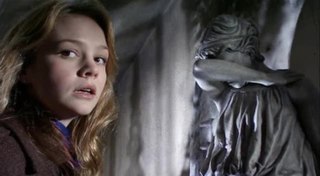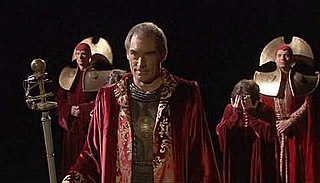
The Doctor is the title character in the long-running BBC science fiction television programme Doctor Who. Since the show's inception in 1963, the character has been portrayed by thirteen lead actors. In the programme, "the Doctor" is the alias assumed by a millennia-old humanoid alien, a Time Lord who travels through space and time in the TARDIS, frequently with companions. The transition to each succeeding actor is explained within the show's narrative through the plot device of "regeneration", a biological function of the Time Lord race that allows a change of cellular structure and appearance with recovery following a fatal injury.

The Tenth Doctor is an incarnation of the Doctor, the protagonist of the BBC science fiction television series Doctor Who. He is played by David Tennant in three series as well as nine specials. As with previous incarnations of the Doctor, the character has also appeared in other Doctor Who spin-offs. Tennant's time as the Tenth Doctor is highly regarded among fans of the show and is considered one of the most iconic incarnations of the character, often ranked alongside Tom Baker's Fourth Doctor.
"The Empty Child" is the ninth episode of the first series of the British science fiction television programme Doctor Who, which was first broadcast on BBC One on 21 May 2005. It was directed by James Hawes, and was the first official episode written by Steven Moffat, who previously wrote the Comic Relief mini-episode "The Curse of Fatal Death" in 1999. He would later become the showrunner and main writer of Doctor Who from the fifth to tenth series. "The Empty Child" is the first of a two-part story, which continued and concluded with "The Doctor Dances", on 28 May.
"The Doctor Dances" is the tenth episode of the first series in the reboot of the British science fiction television programme Doctor Who, which was first broadcast on BBC One on 28 May 2005. It is the second of a two-part story, following the broadcast of "The Empty Child" on 21 May.
"The Impossible Planet" is the eighth episode of the second series of the British science fiction television series Doctor Who, which was first broadcast on BBC One on 3 June 2006. It is the first part of a two-part story. The second part, "The Satan Pit", was broadcast on 10 June.

"Blink" is the tenth episode of the third series of the British science fiction television series Doctor Who. It was first broadcast on 9 June 2007 on BBC One. The episode was directed by Hettie MacDonald and written by Steven Moffat. The episode is based on a previous short story written by Moffat for the 2006 Doctor Who Annual, entitled "'What I Did on My Christmas Holidays' By Sally Sparrow".
"Silence in the Library" is the eighth episode of the fourth series of the revived British science fiction television series Doctor Who. It was first broadcast on BBC One on 31 May 2008. It is the first of a two-part story; the second part, "Forest of the Dead", aired on 7 June. The two episodes make up the second two-parter Steven Moffat contributed to the series after "The Empty Child" and "The Doctor Dances" from the first series. It is also the final story that Moffat wrote before replacing Russell T Davies as head writer and showrunner starting from the fifth series in 2010.
"The Doctor's Daughter" is the sixth episode of the fourth series of British science fiction television series Doctor Who. It was broadcast on BBC One on 10 May 2008.

"Journey's End" is the thirteenth and final episode of the fourth series of the British science fiction television series Doctor Who, which was first broadcast on BBC One on 5 July 2008. It is the second episode of a two-part crossover story featuring the characters of spin-off shows Torchwood and The Sarah Jane Adventures, preceded by "The Stolen Earth", which aired on 28 June. At 65 minutes in length, it was approximately 20 minutes longer than a standard fourth-series episode. It marked the final regular appearances of every companion introduced in the Russell T Davies era, including Catherine Tate as Donna Noble.

"Turn Left" is the eleventh episode of the fourth series of British science fiction television series Doctor Who. It was written by showrunner Russell T Davies and broadcast on BBC One on 21 June 2008.

"The End of Time" is a two-part story of the British science fiction television series Doctor Who, originally broadcast in the United Kingdom on BBC One on 25 December 2009 and 1 January 2010. It is the fifth Doctor Who Christmas special and the last entry in a series of specials aired from 2008 to 2010. It marks the final regular appearance of David Tennant as the Tenth Doctor and introduces Matt Smith as the Eleventh Doctor. At the time, it was the last Doctor Who story written and produced by Russell T Davies, who shepherded the series' return to British television in 2005 and served as the series's executive producer and chief writer. He returned to that role in 2022 in time for the 60th anniversary specials. Davies was succeeded as executive producer and showrunner by Steven Moffat.

The fifth series of the British science-fiction television programme Doctor Who was originally broadcast on BBC One in 2010. The series began on 3 April 2010 and ended on 26 June 2010. The series is the first to be led by Steven Moffat, who took over as head writer and executive producer when Russell T Davies ended his involvement in the show after "The End of Time". The series has 13 episodes, six of which were written by Moffat. Piers Wenger and Beth Willis were co-executive producers, and Tracie Simpson and Peter Bennett were producers. Although it is the fifth series since the show's revival in 2005, the series' production code numbers were reset.

"The Eleventh Hour" is the first episode of the fifth series of the British science fiction television programme Doctor Who, first broadcast on BBC One and BBC HD on 3 April 2010. The episode, written by then-new head writer and executive producer Steven Moffat and directed by Adam Smith, saw a complete change in cast and production crew.
"The Time of Angels" is the fourth episode of the fifth series of the British science fiction television series Doctor Who, which was first broadcast on 24 April 2010 on BBC One. It is the first episode of a two-part story written by showrunner Steven Moffat and directed by Adam Smith; the second episode, "Flesh and Stone", aired on 1 May. Moffat utilised the two-part episode to bring back a couple of his previous creations: the Weeping Angels from his series three episode "Blink", and River Song from the series four episodes "Silence in the Library" and "Forest of the Dead".

The Ninth Doctor is an incarnation of the Doctor, the protagonist of the BBC science fiction television series Doctor Who. He is portrayed by Christopher Eccleston during the first series of the show's revival in 2005. Within the series' narrative, the Doctor is a centuries-old alien Time Lord from the planet Gallifrey who travels in time and space in the TARDIS, frequently with companions. At the end of life, the Doctor regenerates; as a result, the physical appearance and personality of the Doctor changes. Eccleston's Doctor was a war-torn loner who disguises his trauma brought on by the Time War using a sense of humour and determination to protect the innocent. The production team's approach to the character and Eccleston's portrayal were highlighted as being intentionally different from his predecessors, with Eccleston portraying the character as being less eccentric.
"The Big Bang" is the thirteenth and final episode of the fifth series of British science fiction television programme Doctor Who, first broadcast on 26 June 2010 on BBC One. It is the second part of the two-part series finale; the first part, "The Pandorica Opens", aired on 19 June. The episode was written by head writer and executive producer Steven Moffat and directed by Toby Haynes.

"The Doctor's Wife" is the fourth episode of the sixth series of the British science fiction television series Doctor Who, which was broadcast on 14 May 2011 in the United Kingdom, and later the same day in the United States. It was written by Neil Gaiman and directed by Richard Clark.

"The Angels Take Manhattan" is the fifth episode of the seventh series of the revived British science fiction television series Doctor Who, which was first broadcast on BBC One on 29 September 2012. It is the last in the first block of episodes in the seventh series, followed by the 2012 Christmas special "The Snowmen". The episode was written by head writer Steven Moffat and directed by Nick Hurran.

"The Day of the Doctor" is a special episode of the British science fiction television programme Doctor Who, marking the programme's 50th anniversary. It was written by Steven Moffat, an executive producer alongside Faith Penhale. It was shown on BBC One on 23 November 2013, in both 2D and 3D. The special was broadcast simultaneously in 94 countries, and was shown concurrently in 3D in some cinemas. It achieved the Guinness World Record for the largest ever simulcast of a TV drama and won the Radio Times Audience Award at the 2014 British Academy Television Awards.

The 2013 specials of the British science fiction television programme Doctor Who are two additional episodes following the programme's seventh series. In addition to the traditional Christmas episode broadcast on 25 December 2013, a feature of the revived series since 2005, there was also a special celebrating the 50th anniversary of the programme broadcast on 23 November 2013, both airing on BBC One.













